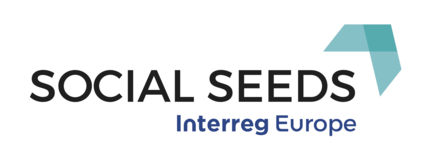This year the 2nd edition of European Summer School has been organized by the SIC Social Innovation Community project financed under Horizon 2020 in Bologna, Italy. At the event, SOCIAL SEEDS was represented by our project leader Mária Baracsi, who presented the SOCIAL SEEDS project to the participants - its methodologies, progress and good practices identified, as the example of the role of regions in Europe in social innovation support, and facilitated practical workshops.
Supportive and collaborative attitude towards our project activities from the organizers and SIC Social Innovation Community stakeholders from all over the Europe motivated us to engage into discussions about the possibility to host a Summer School in Budapest, in the future.
Moreover, currently the OECD is in a process of preparation of similar policy self-assessment tool to one, we have developed within our SOCIAL SEEDS project. As we have discovered several overlaps between both methodologies, we are happy to announce that the OECD is planning to start discussion with our project lead and they have proposed us an invitation to their dedicated working group meetings.
Our methodology – TEMPEST European Standardized Evaluation and Supporting System
|
About the European Summer School on Social Innovation 2017
The second edition of SUMSIC was organized in partnership with AEIDL, DRIFT, Nesta, Reves, Sinnergiak, SIX, Technical University of Dortmund, Young Foundation and ZSI at the University of Bologna. The SUMSIC 2017 aimed at presenting an opportunity for a lively discussion about the role of regions as possible ecosystems for social innovation. In this respect, a special emphasis has been devoted to the importance of history and culture of a region for the development of such ecosystem, as well as the role of institutions, private and public, to support and facilitate such development and all of the discussions orientated to assess the policy relevance of the topics examined.
The school provides the participants with presentations of cases and experiences of social innovation in regions in and outside the EU, as well as general lectures and talks. In line with the learning objectives of the summer school, three parallel workshops were organized in the afternoons in order to tackle challenges proposed by stakeholders of the Social Innovation Community in the Emilia-Romagna region. Each group presented the results of the work conducted in the school in a final presentation in a plenary session the last day of the school. Moreover, study visits were organised in order to give participants a better understanding of the ecosystem of social innovation in the Bologna region.



